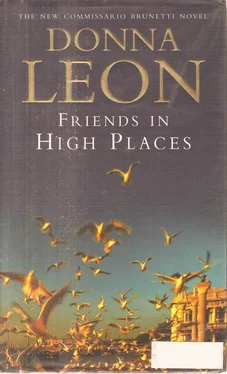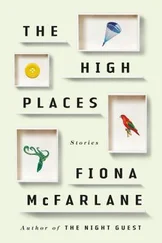He nodded.
‘Then which is Patta?’ she asked. ‘One of us or one of the powerful people?’
‘Patta?’
‘Yes, Patta. If you think it’s all right for small people to try to get around the system, but it’s wrong for big people to do it, which is Patta?’ When Brunetti hesitated, she said, ‘I ask because you certainly make no attempt to disguise your opinion of what he did to save his son.’
Anger, instant and fierce, flooded him. ‘His son is a criminal.’
‘He’s still his son.’
‘And that’s why it’s all right for your father to corrupt the system, because he’s doing it for his daughter?’ The instant the words were out of his mouth, he regretted them, and the regret overwhelmed his anger, snuffing it entirely. Paola looked across at him, mouth open in a tiny o, as if he had leaned across and slapped her.
At once he spoke: ‘I’m sorry. I’m sorry. I shouldn’t have said that.’ He put his head back against the chair and shook it from side to side. He wanted to close his eyes and make all of this go away. Instead, he raised a hand, palm up, then let it fall to his lap. ‘I’m really sorry. I shouldn’t have said that.’
‘No, you shouldn’t have.’
‘It’s not true,’ he said by way of apology.
‘No,’ she said, voice very calm. ‘I think that’s why you shouldn’t have said it. Because it is true. He did it because I’m his daughter.’
Brunetti was about to say that the other part wasn’t true: Conte Falier couldn’t corrupt a system that was already corrupt, had probably been born corrupt. But all he said was, ‘I don’t want to do this, Paola.’
‘Do what?’
‘Fight about this.’
‘It doesn’t matter.’ Her voice was distant, disinterested, faintly imperious.
‘Oh, come on,’ he said, angered again.
Neither of them said anything for a long time. Finally Paola asked, ‘What do you want me to do?’
‘I don’t think there’s anything you can do.’ He waved a hand toward the letter. ‘Not after we’ve got that.’
‘I suppose not,’ she agreed. She held it up. ‘But beyond this?’
‘I don’t know.’ Then, in a softer voice, he said, ‘I suppose you can’t be asked to return to the ideals of your youth?’
‘Would you want me to?’ At once she added, ‘It’s impossible; I have to tell you that. So my question is entirely rhetorical. Would you want me to?’
As he got to his feet, however, he realized that a return to the ideals of their youth was no guarantee of peace of mind.
He went back into the apartment, then emerged a few minutes later with two glasses of Chardonnay. They sat together for half an hour, neither saying much of anything, until Paola glanced at her watch, got up, and said she would begin dinner. As she took his empty glass, she bent down and kissed his right ear, missing his cheek.
After dinner, he lay on the sofa, caught up in the hope that he would somehow find the means to keep his family at peace and that the terrible events with which his days were filled would never lay siege to his home. He tried to continue with Xenophon, but even though the remaining Greeks were nearing home and safety, he found it difficult to concentrate on their story and impossible to concern himself with their two-thousand-year-old plight. Chiara, who came in at about ten to kiss him goodnight, said nothing about boats, little realizing that, if she had, Brunetti would have agreed to buy her the QE2.
* * * *
As he had hoped, when he bought the paper on his way to work the next morning he found his headline on the front page of the second section of Il Gazzettino and sat at his desk to read it through. It was all more horrible and more urgent than he had made it sound, and, like so many of the wild fancies that appeared in this particular publication, it sounded utterly convincing. Though the article stated clearly that this therapy functioned only against possible transmission by biting – how much nonsense would people believe? – he feared the hospital would be swamped with drug addicts and infected people, hoping for the magic cure said to be in the possession of the doctors of the Ospedale Civile and available on request at the Pronto Soccorso. On the way in, he had done something he seldom did, bought La Nuova, hoping that no one who knew him would see him with it. He found it on page twenty-seven: three columns, even a picture of Zecchino, apparently cropped from some larger group scene. If possible, the danger of the bite sounded infinitely graver, as did the hope offered by the cure to be had only at the Pronto Soccorso.
He had been in his office no more than ten minutes when the door was thrown open and Brunetti looked up, first startled and then astonished to observe Vice-Questore Giuseppe Patta standing in the doorway. But he didn’t stand there long: within seconds, he was across the room and directly in front of Brunetti’s desk. Brunetti started to get to his feet, but Patta raised a hand as if to push him back down, then clutched the hand into a fist and brought it crashing down on Brunetti’s desk.
‘Why have you done this?’ he shouted. ‘What have I ever done to you that you’d do this to us? They’ll kill him. You know that. You must have known that when you did it.’
For a moment, Brunetti feared that his superior had gone mad or that the stresses of his job, perhaps the private stresses of his life, had driven him beyond the point where he could contain his feelings, and he had been forced across some invisible barrier into heedless rage. Brunetti placed his hands palm down on his desk and was very careful not to move or attempt to get up.
‘Well? Well?’ Patta shouted at him, placing his own palms flat on the desk and leaning across it until his face was very close to Brunetti’s. ‘I want to know why you did this to him. If anything happens to Roberto, I’ll destroy you.’ Patta stood upright, and Brunetti noticed that his hands were now clasped into tight fists at his side. The Vice-Questore swallowed and then demanded, ‘I asked you a question, Brunetti,’ in a voice filled with soft menace.
Brunetti moved backward in his chair and grasped its arms. ‘I think you better sit down, Vice-Questore,’ he said, ‘and tell me what this is all about.’
Any calm that might have settled on Patta’s features vanished, and he shouted again, ‘Don’t lie to me, Brunetti. I want to know why you did it.’
‘I don’t know what you’re talking about,’ Brunetti said, letting some of his own anger slip into his voice.
From the pocket of his jacket, Patta pulled out yesterday’s newspaper and smacked it down on Brunetti’s desk. ‘I’m talking about this,’ he said, jamming an angry finger at the page. ‘This story that says Roberto is about to be arrested and will surely testify against the people in control of the drug business in the Veneto.’ Before Brunetti could respond, Patta said, ‘I know how you work, you northerners, like a secret little club. All you have to do is call one of your friends on the paper, and he’ll print any shit you give him.’
Suddenly exhausted, Patta sank down into a chair that stood in front of Brunetti’s desk. His face, still red, was covered with perspiration, and when he tried to wipe it away, Brunetti saw that his hand was shaking. ‘They’ll kill him,’ he said, almost inaudibly.
Realization overcame Brunetti’s confusion and his sense of outrage at Patta’s behaviour. He waited a few moments until Patta’s breathing had grown more normal and said, ‘It’s not about Roberto,’ striving to keep his voice calm. ‘It’s about that boy who died of an overdose last week. His girlfriend came in and told me she knew who sold him the drugs, but she was afraid to tell me who it was. I thought this would encourage him to come in voluntarily to talk to us.’
Читать дальше











